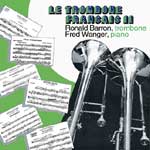
LE TROMBONE FRANCAIS II
Boston Brass Series BB-1005CD


With Fredrik Wanger, piano.
CD CONTENTS
Petite Suite (1953): Serge Baudo (b.1927)
Concerto (1956): Henri Tomasi (1901-1971)
Piece Concertante (1898): Samuel-Alexandre Rousseau (1853-1904)
Choral, Cadence et Fugato (1950): Henri Dutilleux (b.1916)
Sonatine (1957): Jacques Castérede (b.1926)
Ballade (1940): Frank Martin (1890-1974)
Ballade (1944): Eugene Bozza (1905-1991)
Special (1969): Pierre Gabaye (b.1930) arr. Paul Hunt
REVIEWS
International Trombone Association Journal Vol. 30, No. 4, October 2002
Ronald Barron, principal trombonist of the Boston Symphony Orchestra since 1975, also served as principal trombonist of the Boston Pops Orchestra for 13 seasons. This is one of six solo recordings he has made.
Barron's choice of French works for trombone and piano are among the most widely performed compositions by well-known French composers.
This CD demonstrates Barron's technique, control of all registers, very good sound, and sparkling musicianship. His playing sets a good example for young and old trombone players, in phrasing, articulation, intonation and style. This is a CD you should put in your collection, especially if you or your students play French repertoire.
Larry Weed, Valencia Community College
The Trombonist (British Trombone Society) Spring 2002
Le Trombone Francais II, Ronald Barron, trombone, Fredrik Wanger, piano, Trombone Ensemble conducted by Norman Bolter
The influence of the French, in particular the trombone class of the Paris Conservatoire, on the world of trombone playing is unrivaled. Ron Barron, principal trombone of the Boston Symphony Orchestra, pays homage to this achievement in the second of two recordings dedicated to this school. Most trombonists are familiar with the kind of 'concert piece' commissioned by the conservatoire for end of year exams but here, Mr. Barron includes also some more extensive pieces, the Concerto by Henri Tomasi and the Sonatine from Jacques Castérede.
This recital is presented with a variety of color and sound allied with a real sense of performance. Mr. Barron doesn't play safe and yet all the tracts are played with unerring proficiency and a true sense of character. Whether or not the style of playing is, or is even meant to be genuinely French, seems to me not to matter. For the approach is always appropriate to the music: the soloist playing with flexibility, lyricism and vibrato that is entirely apt. Perhaps in comparison with his other recording reviewed, the approach here is more flamboyant, but generally I get the feeling that this is genuine Ron Barron rather than any insincere pastiche.
The program is well chosen with a range of works stretching form 1898, (Rousseau's Piece Concertante-a delightfully tuneful example of the typical short exam piece) to 1970 (Pierre Gabaye's Special-an ensemble piece of, quite frankly, dubious value, in which Ron is joined by eight other trombonists for a good romp). The well-known Ballade from Frank Martin is also included due to the cultural environment of the composer's Swiss home in Geneva. Most of the pieces have also been recorded elsewhere but this selection seems to highlight the difficulty composers have in ending trombone music convincingly, the Martin being absolutely no exception. Serge Baudo's Petite Suite is maybe not so well known as some other works on the CD, but none the less well worth hearing, and Chorale, Cadence et Fugato (Dutilleux) is a good solution to the short, include-a-bit-of-everything exam type piece.
Ron Barron's sound is set intimately in the rich acoustics of Boston's Symphony Hall and is a vast improvement on Volume I, and Fredrik Wanger is an able accompanist in a role that is often equal to the soloist.(Dudley Bright)

